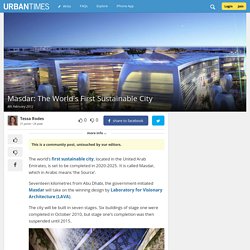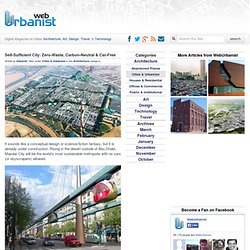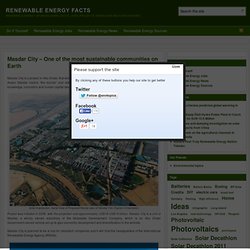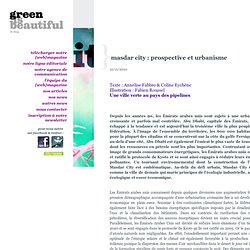

Masdar: The World’s First Sustainable City. This is a community post, untouched by our editors.

The world’s first sustainable city, located in the United Arab Emirates, is set to be completed in 2020-2025. It is called Masdar, which in Arabic means ‘the Source’. Seventeen kilometres from Abu Dhabi, the government-initiated Masdar will take on the winning design by Laboratory for Visionary Architecture (LAVA). The city will be built in seven stages. Six buildings of stage one were completed in October 2010, but stage one’s completion was then suspended until 2015. Source: LAVA Some of the winning design elements include: Zero carbon, zero wastePowered entirely by renewable energy sources“Sunflower” umbrellas that can mediate outside temperatureWall surfaces that adapt to changing temperaturesRooftop gardensAdaptive building facades that adjust to capture sunlightUnderground water storageSustainability-minded five-star hotel, central plaza, convention center, entertainment complex, and shops Read more about sustainable tourism.
Self-Sufficient City: Zero-Waste, Carbon-Neutral & Car-Free. Self-Sufficient City: Zero-Waste, Carbon-Neutral & Car-Free Article by Urbanist, filed under Cities & Urbanism in the Architecture category.

It sounds like a conceptual design or science-fiction fantasy, but it is already under construction. Rising in the desert outside of Abu Dhabi, Masdar City will be the world’s most sustainable metropolis with no cars (or skyscrapers) allowed. Instead of private personal automobiles, the public rapid transit system represents a shift from ‘mass’ to ‘mini’ in the form of small programmable multi-person vehicles – but that is just the beginning. Solar, wind and geothermal sources will fuel the city – sun-powered desalination plants will provide fresh water for inhabitants, which will in turn be carefully recycled (as will other biological waste). Practicing what it embodies on multiple levels, this new urban area aims to be the definitive regional hotpot for developing green energy and researching clean technology. Masdar: The City of the Future. Masdar City – One of the most sustainable communities on Earth. Masdar City is a project in Abu Dhabi, that will present the world’s first zero-carbon, car and skyscraper-free city.

In Arabic Masdar means “the source” and refers to Masdar the company and Masdar City, being a source of knowledge, innovation and human capital development in the areas of renewable energy and clean technologies. Artist Impression- Aerial View of Proposed Master plan of Masdar City (Eastern Orientation) Project was initiated in 2006. with the projected cost approximately US$18-US$19 billion. Masdar City is a unit of Masdar, a wholly owned subsidiary of the Mubadala Development Company, which is an Abu Dhabi Government-owned vehicle set up to spur economic development and diversification in the emirate. Masdar City is planned to be a hub for cleantech companies and it will host the headquarters of the International Renewable Energy Agency (IRENA). Exterior view of Masdar Institute Campus, Masdar City An interior view of the laboratories at the Masdar Institute. Masdar City : prospective et urbanisme. Depuis les années 90, les Émirats arabes unis sont sujets à une urbanisation croissante et parfois mal contrôlée.

Abu Dhabi, capitale des Émirats, n’a pas échappé à la tendance et est aujourd’hui la troisième ville la plus peuplée de la fédération. À l’image de l’ensemble du territoire, les 600 000 habitants sont pour la plupart des citadins et se concentrent sur la côte du golfe Persique. Mais au-delà d’une cité, Abu Dhabi est également l’émirat le plus vaste de tous et celui dont les ressources en pétrole sont les plus importantes. Contrastant avec leur image de grands consommateurs énergétiques, les Émirats arabes unis ont signé et ratifié le protocole de Kyoto et se sont ainsi engagés à réduire leurs émissions polluantes. Un tournant environnemental dont la construction de l’éco-cité Masdar City est emblématique.
Bâtir responsable, voilà donc le nouveau défi que s’est lancé Abu Dhabi. Découvrir gratuitement les numéros de notre {web}magazine »